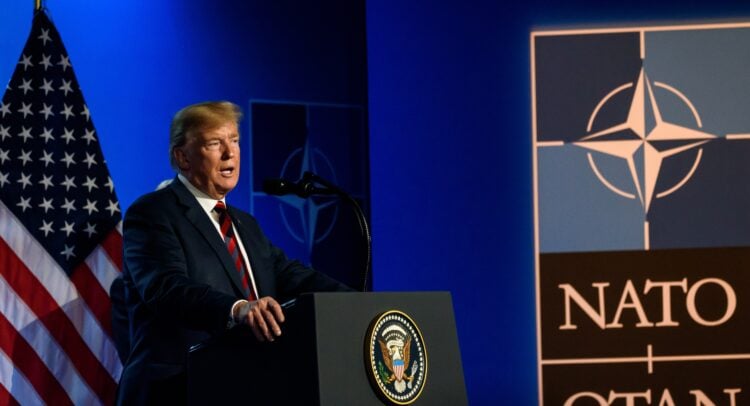Trump’s latest threat to hit Spain with tariffs over defense spending has opened a new front in his NATO fight. The move risks straining U.S.–EU relations and turning alliance diplomacy into a test of economic muscle.
Trump Threatens Tariffs on Spain, Calling Spain ‘Disrespectful’ to NATO
Story Highlights

President Donald Trump is once again using trade as a weapon, and this time it’s aimed at Spain. The president threatened new tariffs on Madrid after the country refused to raise its defense spending to 5% of GDP, calling Spain’s decision “disrespectful” to NATO.
Elevate Your Investing Strategy:
- Take advantage of TipRanks Premium at 50% off! Unlock powerful investing tools, advanced data, and expert analyst insights to help you invest with confidence.
“I’m very unhappy with Spain,” Trump told reporters at the White House. “They’re the only country that didn’t raise their number up to 5%… so I’m not happy with Spain.” He added that he was considering “trade punishment through tariffs” as a response.
Trump Turns Up the Pressure
Trump’s remarks mark a sharp escalation in his long-running campaign to make NATO members spend more on defense. For years, he has accused allies of relying too heavily on U.S. protection while underinvesting in their own militaries. Now, he appears ready to turn that frustration into policy.
By linking defense budgets to trade penalties, Trump is effectively tying NATO commitments to economic leverage. It’s a move that could shake alliance unity and further strain relations with Europe.
Spain Pushes Back
Spanish officials were quick to respond. Prime Minister Pedro Sánchez defended Spain’s record, saying the country contributes to NATO operations even if its defense budget is lower. Madrid currently spends just over 2% of GDP on defense, in line with NATO’s formal target.
Spain’s defense ministry called Trump’s comments “unfortunate,” adding that alliances are built on cooperation, not threats. European officials also warned that any U.S. tariffs on Spain would likely trigger a broader EU response.
What It Means for Trade and Alliances
If the White House follows through, new tariffs could open another front in U.S.–EU trade tensions. The European Union negotiates trade as a bloc, which means targeting Spain alone could violate trade rules and lead to retaliation from Brussels.
The bigger issue, though, is what this says about NATO’s future. Trump’s warning shows how defense spending has become a bargaining chip in global politics. Instead of diplomacy, military cooperation is now being tested through trade pressure.
What to Look Out for Next
Now the focus is on whether Trump makes good on his threat. Tariffs are easy to announce but harder to enforce without blowback from markets and allies. Spain, for its part, seems unlikely to shift its defense plans overnight.
The bigger question is how other NATO members react. If they side with Spain, Trump’s pressure campaign could backfire. But if they quietly raise spending to avoid becoming the next target, the president’s hardball tactics may once again change up the rules of global diplomacy.
Stay ahead of macro events with our up-to-the-minute Economic Calendar — filter by impact, country, and more.
1















